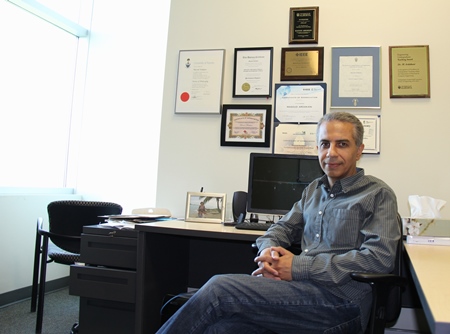
UAlberta electrical engineering professor Masoud Ardakani has won the 2015 Rutherford Award for Excellence in Undergraduate Teaching.
Edmonton-An electrical engineering professor who has won a prestigious University of Alberta teaching award strives to reach his students' "inner engineer" when teaching them challenging and complex subjects.
Masoud Ardakani, who joined the Department of Electrical and Computer Engineering in July, 2005, was presented with the University of Alberta Rutherford Award for Excellence in Undergraduate Teaching last week. In 2012, he won a Faculty of Engineering Undergraduate Teaching Award.
Ardakani teaches two undergraduate courses: Probability Theory for Electrical Engineers and Introduction to Communications Systems. Both are challenging courses; even though the class on communications systems is labelled "introductory" it is taught to students in their third year of engineering. In both cases, Ardakani provides students with real-world examples of how they will be applying their knowledge as engineers.
"Both of these courses are very math intensive, so it can be a challenge to motivate the students. I try to keep the engineer inside them happy by linking concepts to engineering practices," he said.
He also tries to make sure students are aware that they're learning across a continuum. He wants them to know that just as one chapter in a textbook is related to previous and subsequent chapters, one class in an engineering program builds on and prepares students for others.
Ardakani finds a direct connection, for example, between the Probability Theory and Communications Systems courses.
At the beginning of his course on probability theory he asks students how they think chance is involved in engineering.
"The reason I ask this question is to clear up a misunderstanding. Modern engineering has to account for randomness in the real world," he said. "In modern engineering we cannot assume we have all of the knowledge and exact measurements and then go ahead with a design . . . we have to have an understanding of random events, and throughout the course we use real-life examples of where this comes into play."
It turns out that accounting for random events is a vital part of electronic communications, ensuring that voice and data transmissions make it from point A to point B intact, without being interfered with or contaminated by other signals.
In his communications theory course, he uses the example of old-fashioned telephone systems we see in movies to illustrate how the work students are doing is relevant to everyday living. Decades ago anyone placing a phone call dialed an operator and told the operator who they were calling. The operator would physically connect the calls by plugging in wires on a large switchboard.
"The question back in those days was "How many operators do we need?" and it was difficult to answer because the number of calls being made was completely random," said Ardakani. The problem was solved by the famous mathematician and engineer Agner Erlang who developed the Erlang distribution formula.
The same communications challenge exists today.
"It's still the same story, but today we ask 'How many chips do we need?' or 'What is the capacity of the chips?' The students realize that the problems are similar.
"It also teaches them that we can still learn from what people have done 100 years ago."
Ardakani began teaching when he was in high school, tutoring other high school students. "I love teaching," he said. "From those early days I knew I wanted to be a teacher."
He teaches in a way that allows students to see the practical application of what they are learning. A textbook may suggest introducing a concept, then adding details and then giving examples of the concept at work, but Ardakani will reverse that, first showing students what they are working toward. He then has them solve problems based on knowledge they already possess, building their confidence before adding layers of complexity.
"This helps them see how new knowledge is linked to past knowledge, that it is based on something they already know."
Winning the Rutherford Award is "an honour" that he appreciates, but he says he gets a lot of personal satisfaction knowing he is helping others.
"It's hard to explain-it's a good feeling to be a part of this transfer of knowledge. For me, it's one of the main things that makes us human. It makes us different and being part of that gives me a lot of satisfaction."
This is the latest in a string of prestigious teaching awards for Faculty of Engineering professors. Over the past two years teaching awards have included two APEGA awards for Excellence in Education, an Engineers Canada Medal for Distinction in Engineering Education, and one U of A Rutherford Teaching Award for Excellence in Undergraduate Teaching. Department of Chemical and Materials Engineering professor Dominic Sauvageau won this year's Provost's Award for Early Achievement of Excellence in Undergraduate Teaching.